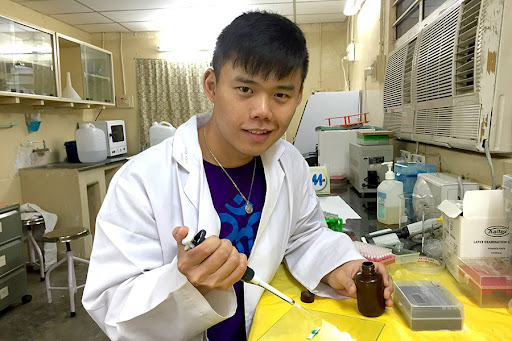
Ten years ago, Hunter Lin was 11 years old and working two jobs in China. Today he’s a graduate nursing student at Johns Hopkins University and the founder of a biomedical start-up company that hopes to launch technology at the end of 2017 to change how doctors diagnose diseases around the world. He credits TRIO with giving him a chance.
Success didn’t happen overnight. Lin was born in the Commonwealth of the Northern Mariana Islands, a U.S. territory of the Philippines. His family moved several times to pursue a better life: to the Philippines, where his father was a food-cart cook, and then to China, his father’s homeland. Ultimately Lin and his sister ended up in California in the care of relatives who couldn’t adequately provide for them, and they became homeless.
Yet, miraculously, homelessness provided a means for Lin to turn his life around. Through San Diego’s Toussaint Academy for homeless teens, a family adopted Lin, helped him with the college application process, and connected him to a regent at St. Olaf’s College in Northfield, Minnesota. He applied to St. Olaf’s, was accepted, and began his college career in the St. Olaf’s TRIO Student Support Services (SSS) Summer Bridge Program.
During the five-week program, Lin and fellow low-income, first-generation student participants took college courses and engaged in other academic, social, and physical activities to warm up for the fall semester. When the school year began in September, the Summer Bridge students availed themselves of TRIO Student Support Services (SSS), which backed their college success with workshops, advising, mentoring, and supplemental instruction. Indeed, 86 percent of students in St. Olaf’s 2007-2013 Student Support Services graduated. This compares with the national graduation rate of 90.5% for students from the highest income quartile and the national graduation rate of 18.6% for students from the lowest income quartile.
When Lin’s summer teaching assistant job fell through the summer before his senior year, he turned to the St. Olaf’s TRIO McNair Scholars Program, which provides TRIO-eligible students with research opportunities, summer research funding, and graduate school support and preparation. McNair found a place for him on St. Olaf’s neuroscience research team, developing minimalistic electromyography (EMG) device that records the electrical activity of muscles to detect abnormalities in severe diseases like leprosy, multiple sclerosis, and Parkinson’s. Lin was part of a team that published a paper in The Journal of Undergraduate Neuroscience Education on how anyone can build elementary EMG equipment from scratch, making the technology — typically costs $50,000 — accessible to clinicians worldwide. “McNair opened my eyes to research possibilities and solving important problems,” he says. “I thought, ‘Oh my God, we get to help people globally and make real changes.'”
The idea for his start-up company’s product came to Lin when he worked at a leprosy clinic in India as part of St. Olaf’s Biology in India research program. A 68-year-old woman went to the hospital with a severe reaction to a drug she was taking for leprosy. While waiting three days for lab results, the response resulted in permanent nerve damage and deformity.
“What if I told you that doctors could have prevented the nerve damage and deformity?” he now asks in his role as founder of his company atPoint LLC. “Diagnostic testing is crucial to the outcome of disease, but conventional techniques are slow, expensive, and inaccessible. There are hundreds of diseases out there that we could arrest with nanotechnology-based diagnostics that doctors can use at the point of care.”
His company’s PhorEX1 blood test equipment is potentially an entire pathology lab in a hand-held device about the size of a cell phone. Clinicians drop a patient’s blood into the device and, in less than five minutes, have a reliable diagnosis for dozens of infectious and autoimmune diseases. Based on proprietary nanotechnology, the low-cost device is a boon for hospitals in developing countries that lack funding for conventional equipment. Lin designed the device for leading market industries such as the U.S., but the company plans to offer it to developing countries at no cost. “Ultimately, our goal is to help lower the costs associated with healthcare. atPoint LLC brings laboratory diagnostics directly to patients in a highly economical way, and in levels of precision that was only possible before in a lab setting,” he says.
Lin feels so strongly about the difference TRIO programs made in his life that he wrote a case study on the effectiveness of TRIO on students like himself. “None of the opportunities would have presented without TRIO. It made all the difference,” he says.